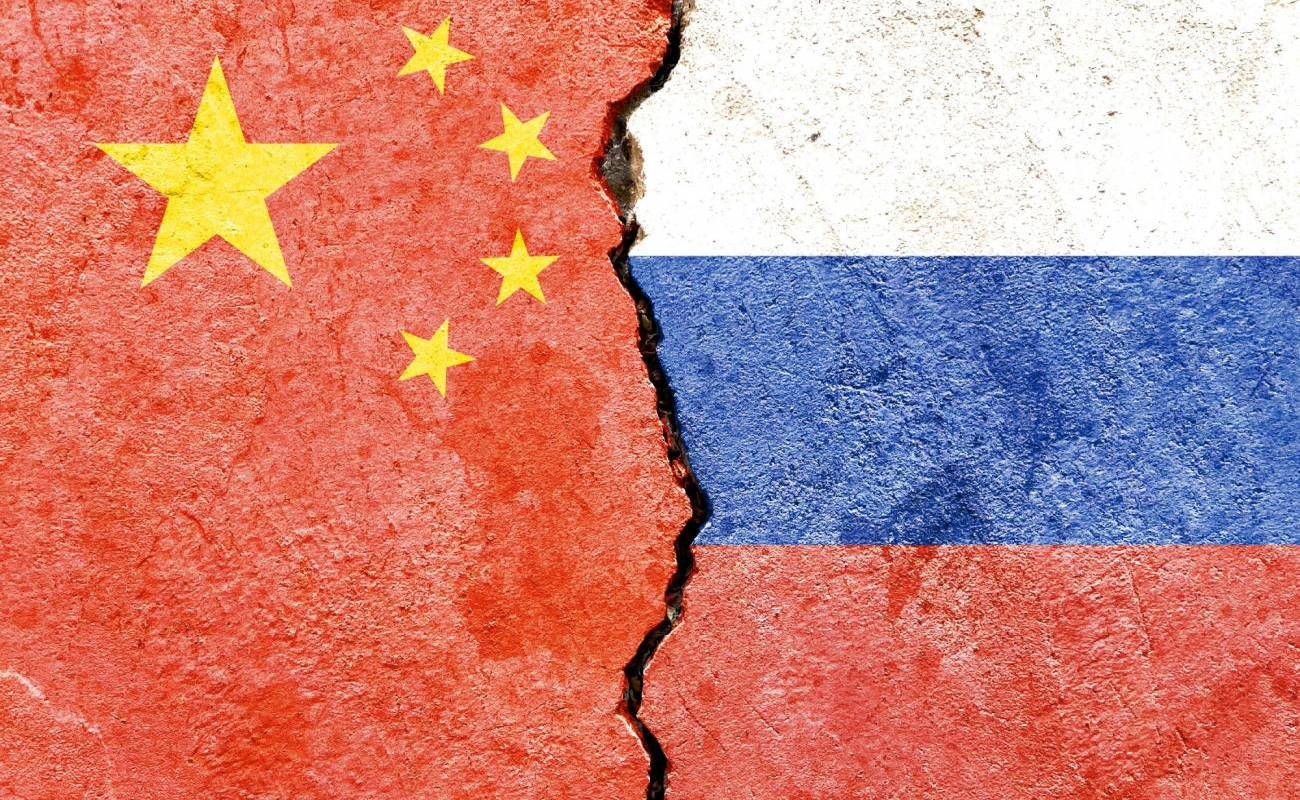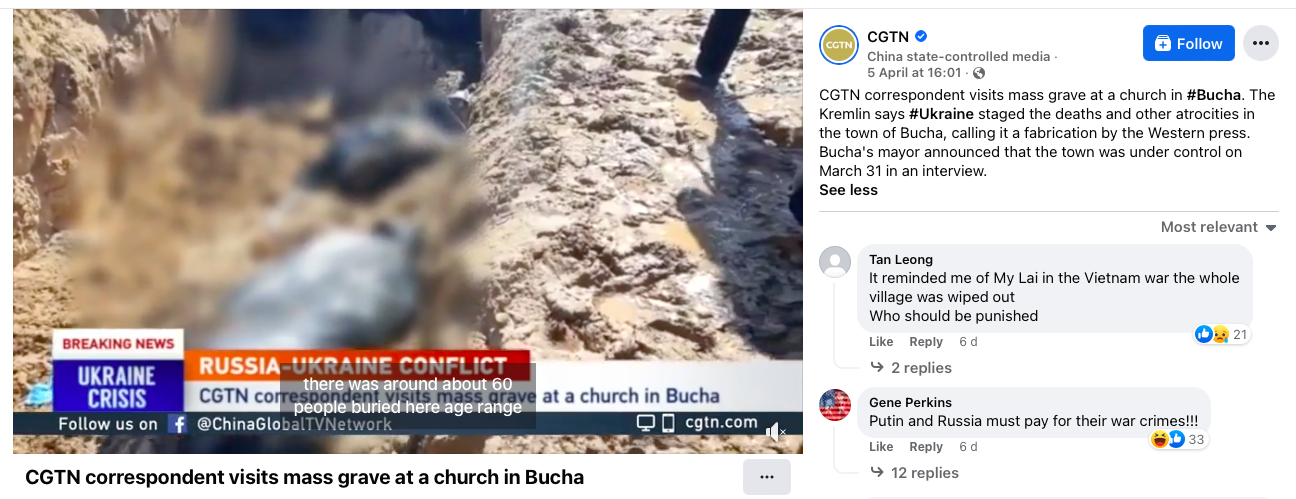“Friendship Has no Limits:” Is China Helping Russia in the Information War?
A Chinese state-owned media network is providing the Kremlin with information support amidst the Russian invasion of Ukraine.

On February 4, 2022, the XXIV Winter Olympics began in Beijing. On the very same day, Chinese leader Xi Jinping and Russian President Vladimir Putin issued a joint declaration that the friendship between their countries had "no limits." When Russia invaded Ukraine on February 24, many in Ukraine and in the West wondered whether this "friendship" would promptChina to assist Russia in its attack.
As of April 11, there is no evidence that China has assisted Russia in any military capacity. However, the situation is different on the information front. As we were working on our article about how years of Russian disinformation have led to mass civilian deaths in Ukraine, we stumbled upon a video from the Russian-language service of Chinese state-owned outlet CGTN. In this video, a CGTN correspondent reported about the ruined town of Volnovakha, Donetsk Oblast, while standing near a car with a "Z" symbol on it. The story also showed a woman who said that the locals were happy to see Russian troops entering the city and argued that Ukrainian tanks were hiding behind residential buildings, although there is no way to verify that she was indeed a local.
We studied which various language versions of CGTN have reported about the Russia-Ukraine War since February 24. It turns out that CGTN has spread quite a lot of Russian propaganda narratives.
CHINA'S "GLOBAL VOICE"
China Global Television Network (CGTN), the country's foreign-language television service, broadcasts in five languages: English, French, Spanish, Arabic, and Russian. The network is controlled by the Chinese Communist Party's Publicity Department, which makes it quite similar to Russian state-owned information networks such as RT and Sputnik.
According to data from SimilarWeb, the agency's website records almost 20 million visitors per month, mostly from the United States, China, Canada, the United Kingdom, and Singapore. It is worth noting that the website's audience overlaps not only with other global Chinese news websites like globaltimes.cn and scmp.com, but also with Russian-state owned rt.com and American outlets such as CNN and Reuters.



Source: SimilarWeb
To further analyze the audience of CGTN, we looked at data from Crowdtangle, a public insights tool owned and operated by Meta. There are 29 various public pages on Facebook affiliated with CGTN. Together, these pages have 186 million followers and publish around 401 posts per day. Over the last 30 days, these posts have received more than 8 million reactions (likes, comments and shares).

Source: CrowdTangle
The English-language page of CGTN is the most popular by far. It has 117 million followers, while the French, Arabic and Spanish versions, ranking second, third, and fourth, respectively, have 100 million fewer followers. The Russian-language version is actually the least popular one: it has only slightly more than a million followers.
WHAT DOES CGTN SAY ABOUT THE WAR IN UKRAINE?
Some posts about the war in Ukraine on CGTN Facebook pages come across as rather neutral and unbiased. CGTN does not openly support Russia. However, a deeper look at the content shared by the Chinese state media group reveals instances where it spreads Russian narratives about the war.
First of all, CGTN does not call the war for what it is: a war. Instead, they describe it with phrases like "special military operation" the "conflict in Ukraine,"or saying "Russian troops entered the country." The only time the term "war" appears is when a statement is cited in which this word is specifically used.

Source: Facebook
When CGTN reports on what's happening in Ukraine, they frequently only offer the Russian position. This happens especially often on the Russian-language page. For instance, in one post, Russian CGTN quoted Russia's foreign minister Sergei Lavrov as saying that "Russia is happy with the talks in Istanbul" and "for Russia, the main goal is for Ukraine to be a neutral and non-nuclear state which is not a NATO member." No statements from Ukrainian officials on this matter were provided.

Source: Facebook
CGTN is also reluctant to directly state that Russian troops have committed war crimes in Bucha and other Ukrainian towns. In one post, the English-language CGTN page wrote that "[t]he Kremlin says #Ukraine staged the deaths and other atrocities in the town of Bucha, calling it a fabrication by the Western press." It is even more strange that while the actual article linked to the post is fair and balanced, the Facebook post which accompanies it is not.

Source: Facebook
Chinese state-controlled media also amplified the Russian narrative about "US-funded biolabs in Ukraine." In addition to sharing a statement by Russian foreign minister Lavrov on its Russian-language page, the Facebook page CGTN Français published a statement from Wang Wenbin, a spokesperson for the Chinese Foreign Ministry. In this statement, Wang says "that the international community had great concerns about the objective of American research in biological laboratories in Ukraine" and urged the US "to be frank about its biological military activities in Ukraine and the rest of the world."

Source: Facebook
CGTN has used the war in Ukraine in many cases to attack the West and spread anti-Western narratives in line with what Russian propaganda has been doing for the last eight years. For instance, in of the posts, CGTN quotes Tulsi Gabbard, a former US Representative in Congress who is also often quoted by RT, saying that "President Biden could prevent a war with #Russia by doing something very simple, guaranteeing that #Ukraine will not become a member of NATO." "Why not, and who wins from the conflict?" CGTN adds, suggesting that war in Ukraine is somehow useful for the US, and that it is NATO, not Russia, who is responsible. This is in many ways similar to what Russian propaganda has been saying for all these years.

Source: Facebook
Chinese state-owned media also supported India in its unwillingness to break off trade with Russia. "Many countries are calling to de-escalating the tension with their own diplomatic efforts such as Brazil, China, India, Mexico, Turkey, United Arab Emirates and many African and Middle-Eastern countries. Could the West represent the entire international community?" one post on the CGTN page. This narrative echoes the words of Russia's Sergei Lavrov, who said on March 18 that "America is striving for a unipolar world" and "there are players who would never agree to that."

Source: Facebook
CGTN embeds anti-Western propaganda even in posts where it would not be expected. One shining example is a post which reads that "People protest around the world, showing their solidarity for the people of Ukraine and condemning the Russian invasion." However, the very first picture in this post shows people with a placard that reads "STOPwar NOwar Peace America + ISrail + Nato + Imperialisiom = Terrorism" (sic).

Source: Facebook
CGTN also criticizes the Western sanctions against Russia, saying they are "absurd" and "what was once beyond politics and ideology is now falling into tools for sanctions." Arms supplies from Ukraine's partners get the same treatment. CGTN underlines that "wars and sanctions won't bring peace," and urges "all sides to prioritize fostering peace talks and avoiding humanitarian disasters." Russian officials have used very similar messaging since the beginning of the war.


Source: Facebook
CHINA TO THE RESCUE?
On March 2, the EU rolled out sanctions against the Russian state-owned media companies RT and Sputnik, which effectively suspended their broadcasting activities in Europe. Google has also taken an active position against Russian disinformation actors by taking down YouTube channels associated with pro-Kremlin Russian media outlets. Meta did the same by blocking access to RT and Sputnik in the EU.
Over the years, Russia has invested billions of dollars in its propaganda machine, which made it a good thing that the EU finally started targeting Putin's media empire. However, now that the influence of Russian media companies has decreased significantly, Chinese media aimed at foreign audiences may start to fill in the gap.
Russia has cunningly used Western democracy and freedom of speech against the West itself. Russian media has spread the Kremlin's narratives under the guise of "alternative opinion" and "hidden truth," a strategy which has appealed to conspiracy theorists and "enemies of the establishment." Now, these audiences are likely to turn to Chinese media which, as our analysis shows, act in a very similar manner to their colleagues from Russia. Thus, the Chinese government may further provide Vladimir Putin with information support in the international arena, and, with hybrid warfare in mind, this assistance may prove to be no less important than supplies of military equipment.
